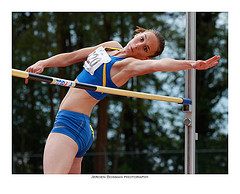Felt Kevin Eikenberry had some great insights about teams.
To Team or Not to Team?
“All of us are smarter than each of us.” and “1 + 1 = 3” are just two common phrases that reinforce and prove how pervasive our belief in teams is.
And that belief is justified.
Sometimes.
The fact is sometimes we would be better off without a team – with individuals contributing as individuals.
What?
No team?
At least not the type of team you probably think of, when you think of a team.
Two Basic Types of Teams
To keep things simple, I believe there are two basic types of teams. There are basketball teams and there are track and field teams.
 Basketball Teams
Basketball TeamsBasketball teams (or soccer or hockey) are teams that require, by the nature of their task, that everyone play as one unit. On teams in these sports, the players are interdependent. At any moment of any game, in order to be successful, the entire team needs to be working in harmony. The role of each player is designated by their position (which takes into account their innate strengths and acquired skills). However, at any moment during the flow of the game, the situation may require any player to take any role.
And on good teams of this sort, all players are willing to be flexible, to assist, to change roles, to “do what it takes.” Because they know that without working together, they can’t achieve their team goals of victory – the nature of the game forces interdependency among the team members.
 Track and Field Teams
Track and Field TeamsPlayers on track and field teams, on the other hand (except in a few relay events), are not interdependent, they are independent. Shot putters have a skill set that is largely unrelated to the sprinters. And the high jumpers can be personally skilled and successful without any tangible help or support from the distance runners.
At the end of the day (or meet), if enough individuals win, the team will win. The most successful of these teams will have highly talented individual contributors, supporting each other to reach their common goal of winning. In this way, they are definitely a team. They may feel allegiance to the group. They certainly can have pride in being a part of the group. They want each other to be successful. They know that they can all be more successful when each individual is more successful. They can have a common goal (to win the meet or championship). But the fundamental relationship between the players isn’t the same as it is on a basketball team.
What This Means to Us
In our organizations, we most likely have both sorts of teams. We have teams that work in a process flow or project where the outputs of one person directly affect the work of the next – where the work and the people are highly interdependent.
We also have teams that look more like the track and field team. In these situations people are working toward a common mission and goal, but their work doesn’t intersect in nearly the same ways as for the highly interdependent teams.
The challenge comes because, in my experience, we tend to want all teams to think they are basketball teams. If the work or project dictates that focus, great. But if you have a track and field (independent) team, you don’t need the same focus on interdependence and traditional “team building” activities.
What Do We Do Now?
If you lead a team or form teams, you need to think about and talk about this distinction. Determine what type of team you have (or need) and gain agreement with others. This will allow for appropriate and effective expectations to be set as well as appropriate plans for training, development and team building.
Knowing which type of team your work or project dictates is the first step towards helping that group of people be more successful and the work being done successfully.
So maybe it isn’t really, “To team or not to team?”, but “Which type of team?” that is the question.
Answer that one first. And, using the answer as a guide, you will be helping all of your teams (and the individuals on them) be more successful.
No comments:
Post a Comment